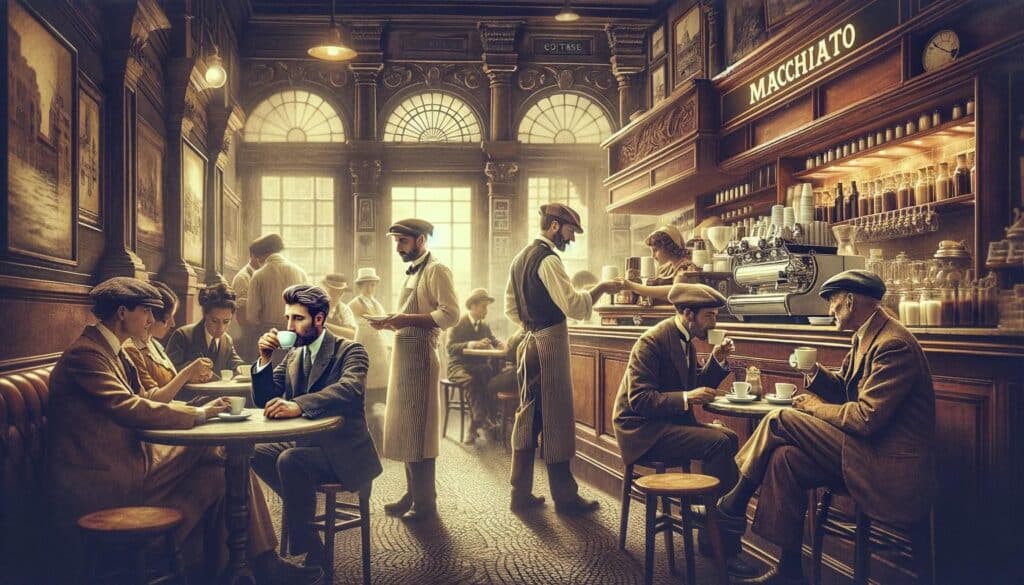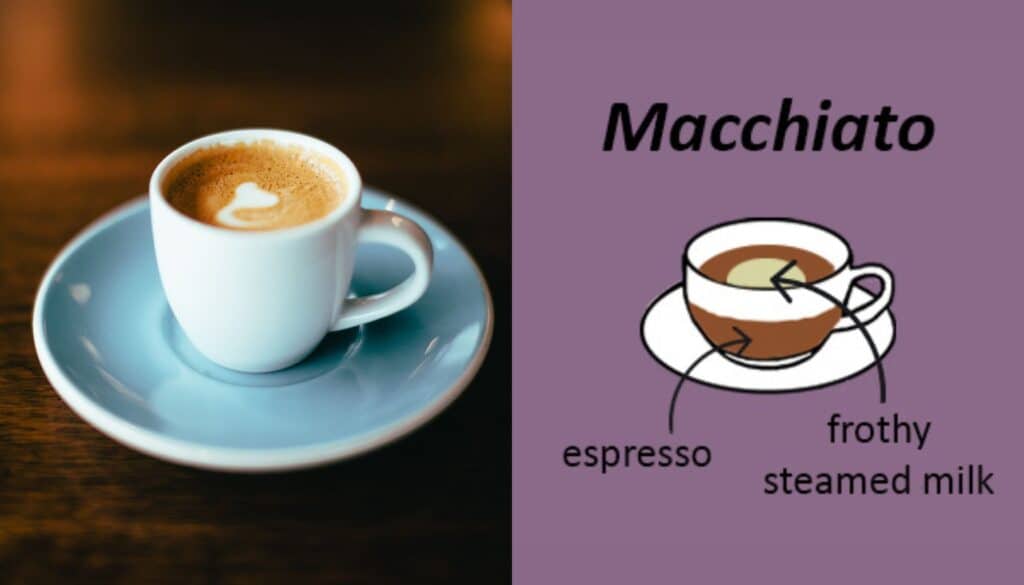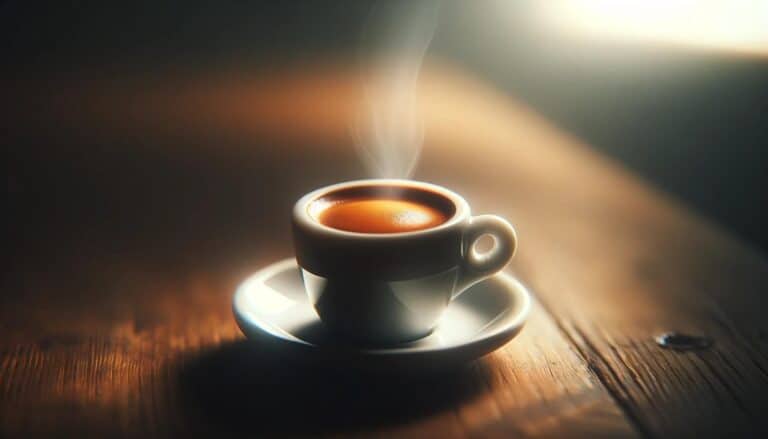Coffee culture has fascinated people all over the world, turning into a lively and refined part of food culture. Today, coffee is more than a simple morning drink; it’s a craft product similar to wine. Coffee lovers hunt for special blends and unique coffee experiences. Among many espresso drinks, the macchiato stands out because of its unique way of making it and its strong flavor.
What is a Macchiato?
A Macchiato is a coffee drink made by adding a small amount of milk, usually frothed, to a shot of espresso. The name “Macchiato,” meaning “marked” in Italian, refers to the espresso being “marked” with milk. It comes in two variations: Espresso Macchiato, where espresso is topped with milk, and Latte Macchiato, where milk is stained with espresso.
The word “macchiato” comes from Italian and means “stained” or “spotted.” This coffee drink started in Italy and has spread worldwide. To make a traditional macchiato, you “stain” a shot of espresso with a little steamed milk. This gives a stronger espresso taste than other milk-based coffees like lattes or cappuccinos, and it’s perfect for those who love a deep, powerful coffee flavor.
In this article, we’ll look at all kinds of macchiatos, from the original Italian style to newer versions like the latte macchiato and caramel macchiato. We’ll dive into the history, how to make them, and the different types. This will help you enjoy and appreciate this special drink more and might even improve your coffee-making skills at home or at a cafe.
Macchiato’s Historical Background

Origins of the Macchiato in Italy
The macchiato has its roots in the rich coffee culture of Italy, where espresso is a way of life. This beverage emerged as a practical solution for workers who wanted to enjoy their espresso during the day without the harshness of the straight shot but still with more strength than a latte or cappuccino. By simply adding a small amount of milk to “mark” the espresso, they could temper the espresso’s bitterness while maintaining its robust character, allowing for a quick, enjoyable coffee break that didn’t overshadow the espresso’s potent flavor.
Meaning of the Word “Macchiato”
“Macchiato” translates to “stained” or “spotted” in Italian, a term that precisely describes the preparation and appearance of the drink. The idea is that the espresso is “stained” by a dash of milk, differentiating it from a regular espresso shot without significantly altering its strength. This nomenclature helps distinguish it from more heavily milked coffees like lattes (“latte” being Italian for milk).
Evolution of the Drink Over Time
Over the years, the macchiato has evolved from its humble beginnings into a versatile beverage that varies significantly from one coffee shop to another. Initially served as a simple espresso with a splash of milk, it has adapted to suit a broader range of tastes and preferences around the world:
- Espresso Macchiato: Stays true to the original, consisting of a single or double espresso shot topped with a dollop of frothed milk.
- Latte Macchiato: This variation starts with steamed milk “stained” by a shot of espresso, essentially reversing the ingredients of the traditional macchiato. It is served in a taller glass, showcasing its layered beauty, with more milk than the espresso variant.
- Modern Variations: The advent of the caramel macchiato and other flavored versions in various coffee chains has further popularized the beverage. These modern takes often include syrups, flavorings, and more elaborate presentations that cater to local tastes and trends.
As the macchiato continues to evolve, it maintains a beloved spot in the global coffee scene, celebrated for both its traditional roots and its modern adaptations. Whether enjoyed in its purest form in a bustling Italian espresso bar or as a sweet, layered concoction in a trendy café, the macchiato remains a testament to coffee’s rich and diverse cultural heritage.
What Makes a Macchiato?

Basic Definition of a Macchiato
A macchiato, at its core, is an espresso-based coffee drink characterized by a small amount of milk added to a shot of espresso. The purpose of the milk is not to overwhelm the espresso but to “stain” it, moderating the intensity of the espresso’s flavor and temperature slightly, while still allowing the coffee’s robust profile to dominate the drink.
Key Ingredients and Traditional Preparation
The traditional macchiato consists of the following key ingredients:
- Espresso: One or two shots, depending on preference.
- Milk: A small amount (usually about a spoonful) of frothed milk is added to the espresso.
Preparation:
- Brew a shot or two of espresso.
- Froth a small amount of milk until it is creamy and foamy.
- Spoon a dollop of the frothed milk on top of the freshly made espresso.
The simplicity of the macchiato’s preparation aims to enhance, rather than mask, the rich flavors of the espresso.
Comparison with Other Coffee Drinks
- Latte: A latte consists of much more milk compared to a macchiato. Typically, it involves one part espresso to three parts steamed milk and is topped with a small amount of frothed milk. Lattes are creamier and milkier, making them less intense in coffee flavor.
- Cappuccino: A cappuccino is somewhat between a macchiato and a latte in terms of milk content. It usually consists of equal parts espresso, steamed milk, and frothed milk, leading to a rich and airy texture but with a stronger coffee flavor than a latte.
- Espresso: An espresso is pure coffee, with no milk added. It is the base of all these drinks and is the strongest in terms of coffee concentration. An espresso offers a deep, complex flavor profile that is significantly diluted in milkier coffee preparations.
The macchiato occupies a unique position in the coffee spectrum. It appeals to those who appreciate the potent flavor of espresso but are looking for just a hint of creaminess to smooth out the experience without the heaviness of a latte or the balanced milkiness of a cappuccino. This distinct characteristic makes the macchiato a favored choice for espresso lovers seeking a slight variation.
Variations of Macchiato

Traditional Macchiato
Description of the Traditional Italian Macchiato
The traditional Italian macchiato is a straightforward drink, consisting simply of a shot of espresso “stained” with a small amount of frothed milk. The milk is merely a complement, meant to soften the espresso’s edge without overwhelming its bold flavor.
Serving Styles and Customary Additions
Traditionally served in a small espresso cup, the traditional macchiato may sometimes be accompanied by a teaspoon of foam or a light sprinkle of cocoa powder or cinnamon, depending on regional or personal preferences. This variant is ideal for those who enjoy the robust flavor of espresso but with a slight moderation.
Espresso Macchiato
Detailed Preparation Method
- Brew one or two shots of espresso into a small cup.
- Froth a small amount of milk until it is smooth and velvety, typically less than what you would use for a cappuccino.
- Gently spoon the frothed milk over the espresso, just enough to “mark” the surface.
Serving Suggestions
Espresso macchiato is best served immediately after preparation to enjoy the contrast of temperatures and textures. It is often enjoyed as a quick, potent pick-me-up that highlights the espresso’s richness with just a touch of milk.
Latte Macchiato
Step-by-Step Breakdown of How It Differs from the Espresso Macchiato
- Start by steaming milk until it is hot and frothy, filling a tall glass about two-thirds full.
- Slowly pour a shot of espresso directly into the center of the frothed milk, allowing it to “stain” through and settle between the milk and foam layers.
Visual and Taste Profile
The latte macchiato will have distinct layers, with milk at the bottom, espresso in the middle, and a layer of foam on top. This drink is milder in flavor compared to the espresso macchiato, with a greater milk-to-coffee ratio, offering a creamy texture and a visually appealing three-layer effect.
Caramel Macchiato
Introduction to This Popular Variation
The caramel macchiato has become widely popular, especially in American coffee chains. It is a more decadent version of the traditional drink, incorporating vanilla and caramel flavors for a sweet, comforting beverage.
Ingredients and Preparation
- Steam milk and vanilla syrup together.
- Pour the flavored milk into a cup, leaving room for foam.
- Add a shot of espresso, allowing it to pour through the milk.
- Drizzle caramel sauce over the foam topping.
How It Differs from Traditional and Other Commercial Macchiatos
Unlike the traditional macchiato, which focuses on the espresso’s purity, the caramel macchiato is about creating a sweet, visually appealing drink that blends coffee with popular dessert flavors. It is often served in a larger glass to accommodate the additional ingredients and to showcase its layered beauty, making it a favorite for those who prefer their coffee on the sweeter side.
How to Order a Macchiato

Ordering a macchiato at a coffee shop can sometimes be confusing due to the various interpretations of the drink. Here are some tips on how to order a macchiato, ensuring you get exactly what you crave.
Understanding the Menu
First, it’s crucial to understand how the macchiato is defined by the coffee shop you are visiting. Menus can vary significantly, and the term “macchiato” might refer to anything from the traditional Italian style to more modern American adaptations like the caramel macchiato.
Communicating Your Preferences
- Specify the Type: Clearly state whether you want an “espresso macchiato,” which will be closer to the traditional style with less milk, or a “latte macchiato,” which is milkier and more similar to a latte.
- Mention Customizations: If you have particular preferences, such as the type of milk (e.g., almond, soy, oat) or any flavor additions like vanilla or caramel, mention these upfront.
- Ask About Sweetness: For drinks like the caramel macchiato, specify your preference for sweetness level. Some shops make them very sweet by default, so you can request less syrup or caramel if you prefer.
- Decide on the Size: Traditional macchiatos are usually served in small portions due to their strong flavor and minimal milk content. However, if you’re ordering a latte macchiato or a flavored variant, be sure to specify the size you’d like.
Examples of How to Order
- “I’d like a traditional espresso macchiato, with just a dollop of froth on top, please.”
- “Could I get a large caramel macchiato with oat milk and just a little caramel on top? I prefer it less sweet.”
- “Can I have a double espresso macchiato, made with soy milk?”
Be Open to Recommendations
If you’re unsure or the coffee shop offers a unique take on the macchiato, don’t hesitate to ask the barista for recommendations. They can guide you based on your taste preferences and might even introduce you to a new favorite.
By clearly specifying your preferences and understanding the variations available, you can ensure that your macchiato order will be just as you like it, whether you’re after the stark simplicity of espresso stained with milk or a sweet, layered concoction.
Conclusion

The macchiato stands as a tribute to the rich and diverse world of coffee, capturing the heart of Italian espresso culture in just one cup. It started as a simple way for baristas to let customers enjoy a mid-day espresso with a splash of milk. Now, the macchiato is a globally recognized coffee drink, known for its strong, bold espresso flavor that is gently softened by milk.
This drink uniquely connects people who love pure espresso and those who like their coffee with milk. Its variations, from the traditional espresso macchiato to the more complex latte macchiato and sweet caramel macchiato, show how coffee culture can adapt to different tastes and preferences. Each type has something special to offer, serving a broad range of coffee lovers.
As you try different styles of macchiato, you’re not just trying out new flavors; you’re also embarking on a cultural journey that spans continents and centuries. Whether you enjoy the plain simplicity of the traditional macchiato or the dessert-like richness of modern twists, each sip connects you to a long coffee tradition.
We encourage you to try making your own macchiato at home, playing with different techniques and ratios to discover your ideal drink. Or, when you visit coffee shops, feel free to ask the barista about their style of macchiato and get recommendations. Through these experiences, you’ll deepen your understanding and enjoyment of coffee, one cup at a time. Embrace the variety of coffee culture and let the macchiato open the door to new and exciting coffee adventures.
Frequently Asked Questions About Macchiatos
What is the difference between a macchiato and a latte?
A macchiato is an espresso “stained” with a small amount of milk, typically just a spoonful of froth. It is much stronger in coffee flavor. A latte, on the other hand, consists of one part espresso to about three parts steamed milk, making it creamier and milder in flavor.
Is a caramel macchiato really a macchiato?
The caramel macchiato popularized by coffee chains is quite different from the traditional macchiato. It usually consists of vanilla-flavored steamed milk, espresso, and is topped with caramel sauce, making it sweeter and much milkier than a traditional macchiato. It’s more of a latte with additional flavors than a true macchiato in the traditional sense.
Can I make a macchiato with non-dairy milk?
Yes, you can make a macchiato with non-dairy milk options such as almond, soy, oat, or coconut milk. Keep in mind that some non-dairy milks may not froth as well as whole cow’s milk, which may slightly alter the texture of the drink.
What kind of coffee should I use for a macchiato?
For the best results, use a high-quality espresso roast coffee. The espresso roast is typically dark, rich, and meant to be used in espresso machines for that concentrated flavor that is characteristic of a macchiato.
How much caffeine is in a macchiato?
The caffeine content in a macchiato will generally depend on the number of espresso shots you use. A single shot of espresso typically contains about 63 mg of caffeine, so a standard single shot macchiato would have roughly the same amount, varying slightly based on the coffee bean and strength of the brew.
Is a macchiato served hot or cold?
Traditionally, a macchiato is served hot, but iced versions are also popular, especially in modern coffee shops. For an iced macchiato, the espresso is cooled down and then poured over ice before being “stained” with cold milk or milk foam.
How do I order a macchiato in Italy?
In Italy, if you order a “macchiato,” you will likely receive what is known internationally as an “espresso macchiato,” which is a shot of espresso with a small amount of milk or foam. If you prefer the milkier version, you might want to specify “latte macchiato.”
Can I add flavors to a traditional macchiato?
While traditionalists might prefer a macchiato with just a touch of milk, you can personalize it by adding flavors such as vanilla, hazelnut, or caramel. This is more common in international coffee cultures than in Italy, where the coffee tradition emphasizes the purity of the espresso.






